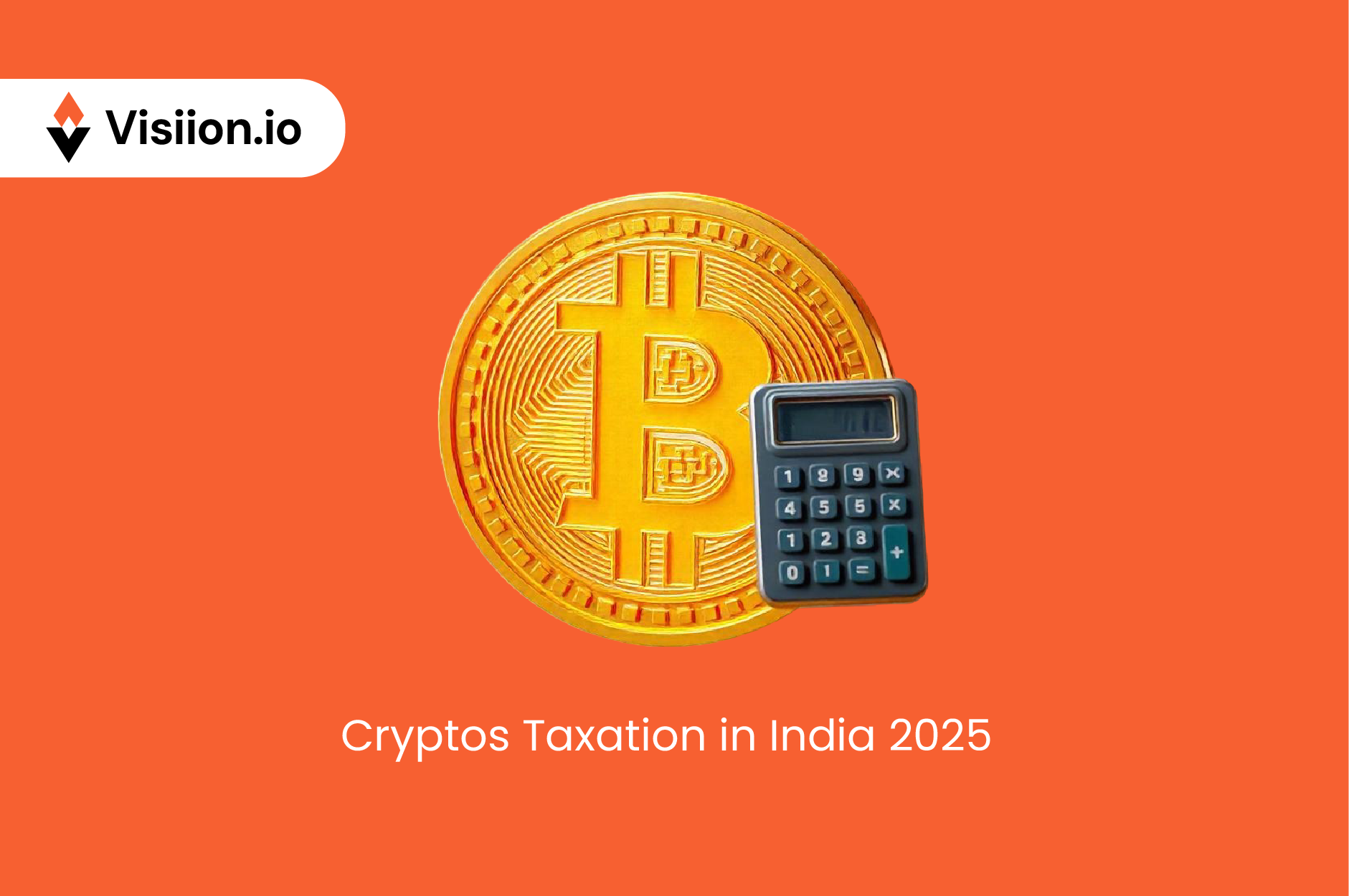Cryptos Taxation in India 2025
Cryptocurrencies saw a boom in India post-COVID. The crypto market exploded in India due to its vast young population and desire to try investment opportunities. But the issue was not crypto regulation; it was a lack of crypto regulation!
But in the past couple of years, Government of India and regulatory authorities have taken a firm stance on the same. They have crafted certain laws to target this ambiguiety. But even today, many crypto traders and investors often find it hard to comprehend what a tax on crypto in India means.
But to resolve this issue, here’s a complete guide on cryptocurrency taxation in India. So, moving without any delay, let’s start.
How is income Tax Charged for Crypto Gains?
Tax on anything you earn via cryptocurrency is calculated today through the Income Tax Act of 1961. Government introduced Section 115BBH with the introduction of Finance Act 2022. This section states that the Income Tax Department considers all cryptocurrencies as virtual digital assets (VDAs) and taxes them accordingly. Here’s a quick overview:
Flat 30% Tax on Gains
You will be taxed at a flat 30% for all profit that you make from selling or otherwise transferring cryptos. It doesn’t matter what your tax slab is or how long you have mopped these assets. In addition, you can not deduct any expenses or losses. Transaction fees, wallet-handling costs and other trading expenses are therefore not deductible.
Example
For example, you bought Bitcoin for ₹2,00,000 and sold it for ₹3,00,000. Result? You made ₹1,00,000 in profit. Now, this ₹1,00,000 will be liable for tax at 30%. Therefore, you will pay in taxes ₹30,000. Suppose you had to pay ₹10,000 as transaction fees when selling. Even then, you can’t write off these costs to reduce your taxable gain. So, your tax liability remains ₹30,000.
Moreover, this tax is levied whether you’re an individual trader/ investor or a person who frequently buys and sells.
TDS on Crypto Transactions
According to Section 194S, 1% TDs is applicable on any crypto transaction in excess of ₹50,000 per year for all normal individuals. However, the limit goes down to ₹10,000 for the professionals. It is worth noting that this TDS applies to your gross value of your transaction and not only profit.
Example
Say you recently sold ETH worth ₹70,000. Here, the buyer deducts ₹700 as TDS and pays it to the Government. But it depends on you whether you claim these credits during your ITR filing or not. So if you are a trader and executed multiple trades, you will have to do multiple TDS entries. And most important point? You’ll have to make sure there are no mismatches when you are filing your tax returns.
Airdrops, staking rewards, and taxes
Many airdrops and staking rewards are available for you. As per the prevailing income tax law, both are taxable under “Income from Other Sources.” The income tax department takes FMV on the date of receipt while calculating tax. In many of these cases, these awards are granted without any direct expense. Even so, their value counts toward your taxable income.
Example
Suppose you get an airdrop of tokens worth ₹10,000. This increases your liability by ₹10,000. So, if you’re in the 30% tax bracket, you’ll need to pay ₹3,000 in taxes for just this airdrop.
However, what if you receive staking rewards? Let’s take an example. You just received a 0.5 ETH staking reward! If the FMV on the day you received this reward was ₹80,000, you will be taxed on this amount even if you do not sell it immediately.
Can you Set-Off Losses?
Currently, you cannot set crypto losses against any income. On top of that, you can’t even offset the losses from crypto against the gains from cryptos. So, if you are a very active trader, be sure to take this into account. If they don’t, taxes will take a large bite out of your profit.
To make matters worse, you cannot offset crypto losses against any other income. It means we pay some part of your trade to transaction cost no mater you are in profit position or gain.
GST on Crypto Transactions
As per the Goods and Services Tax(GST) law, any crypto transaction is classified as a service. Here’s how it works for crypto transactions:
1, Trading Platforms
Trading platforms such as Vision. io is charged 18% GST on the service charge. This clearly indicates that all crypto exchanges charge an 18% GST fee on their transaction fees. Let’s say your net payable service charge is₹100, so you would be required to pay an additional ₹18 as GST. For the record, this is GST, not income tax. So, even if you are making a transaction at a loss, you will be paying GST.
So, even if the platform is based out of India but pursuing Indian citizens, it will have to pay 18% GST to the Government.
2, Barter Transactions
So if you are receiving any goods or services for any cryptos, then GST is also applicable on the value of that transaction. In short, GST will be charged on crypto when you buy it; you’ll have to pay GST on it if you’re buying a product or service using BTC, ETH, or any other crypto. In this, the FMV of the crypto on transaction time is considered to estimate the tax.
Example
For example, if you utilize BTC worth ₹50,000 to purchase a laptop or other device, you must pay ₹50,000 along with GST. The seller will credit this amount against their GST liability. The GST collected by the supplier will be submitted to the Government once you pay this GST to the supplier. To summarize, if you buy something using crypto, you will be paying some kind of indirect tax.
What are Reporting Requirements for Cryptos?
Now, this is where many taxpayers go wrong. As dictated by income tax laws, Taxpayers are required to disclose their cryptocurrency assets and transactions in their Income Tax Returns (“ITRs”). The reason this process needed to be taken is because it helps with transparency and mitigates the chance of getting fined. Now, let’s get into the details:
Form ITR-2 or ITR-3
If an individual has income from a crypto business, then he/she needs to file an ITR-2 or ITR-3. This depends on whether your income comes from business or capital gain. To elaborate, if you are a normal trader or investor, ITR-2 is enough. However, if you are repeatedly trading, you’ll have to submit ITR-2 as your earnings through such frequent trade will be treated as income from business.
Details to Disclose
You must report every aspect of every crypto trade you make. This involves the acquisition date, acquisition cost, transfer date, and sale profits. This kind of detailed reporting aids tax authorities in ensuring that what you report as income is accurate and that tax is calculated properly.
But there will be penalised under section 139(9) for defective return if you are not filing any detail, or misreport the detail.
What are the effects of Not Complying?
The authorities have introduced strict penalties for individuals not complying with crypto tax rules. Here’s what you need to know:
Underreporting of Income
50% for the understatement of income under Sec. 270A If your actual tax liability is ₹100,000 and you report just ₹50,000, you have to pay a penalty of ₹25,000 besides the tax that you didn’t pay.
Failure to Deduct TDS
Another penalty of the same amount as the TDS amount is levied if the buyer does not deduct TDS as per section 194S. This penalty ensures that taxes are collected at the source and eliminates the chances of evasion.
Late Filing of Returns
Filing delayed attracts penalty of up to₹10,000 under section 234F, and charges may also levied under sections 234A, 234B, and 234C as interest for delayed taxes payment. That’s where these penalties can add substantially to the financial hardship of non-compliant taxpayers.
Businesses Have Special Provisions
In addition to the aforementioned, businesses that deal in crypto also have additional regulations to comply with. They are required to keep thorough records of every transaction, such as wallet addresses, transaction IDs, etc. Tax authorities may audit them under Section 44AB to verify compliance.
Tax Audit Requirements
Suppose you have a total crypto transaction exceeding ₹50 lakh, a tax audit is compulsory. The auditor will examine transactions that were part of the accounting records and comply with tax laws Section 271 B – No audit of tax. Get a tax audit done failure.
Advance Tax
Companies to pay advance tax on estimated crypto earnings They attract interest penalties under sections 234B and 234C for not doing so; for example, you must remit ₹25,000 quarterly as advance tax if a ₹10,00,000 has to be paid as tax for the year. Missing these deadlines costs you even more.
Wrapping Up
Through this guide, we hope to provide you with much-needed information on crypto taxation in India. Do keep in mind that crypto regulations in India are a little stricter than in other countries. This is to ensure that crypto and related technology is used for the right reasons by the Indian Government. So play by the rules, stay compliant and timely file your tax returns.
We would also suggest reaching out to crypto tax specialists who can ensure that you maintain compliance with current crypto regulations. Don’t hesitate to visit our website for further information on cryptos.
#CryptoTaxation2025 #CryptocurrencyTax #TaxOnCrypto #CryptoIncomeTax #CryptoTaxFiling #CryptoTaxGuide










